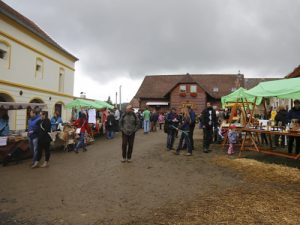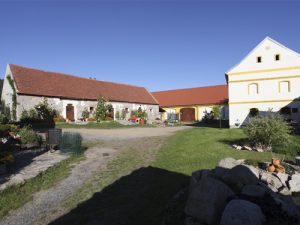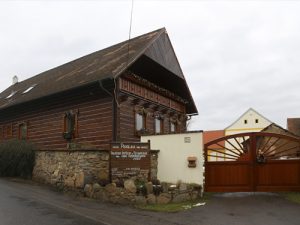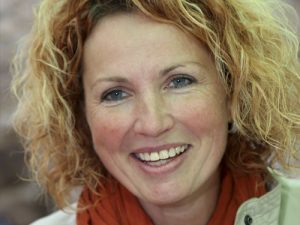In this case study, we present a cooperation between two autonomous family farms that are interconnected by close family ties. The parents, Mr. and Mrs. Pešek, are involved in livestock and plant production and their daughter, Mrs. Hana Hrubá, is a sheep farmer. Both farms are in the Central Bohemian Region of the Czech Republic.
Area: Pešek Family Farm – 180 hectares
Hana Hrubá Family Farm – 50 hectares
The Pešek Family Farm was established in 1991 on 180 hectares of farmland. The farm itself is mainly made up of stony and sandy soil and therefore most of the land (80 hectares) it dedicated to pasture. The rest of the farmland is mainly used for plant production, including cereal crops, rape seed and corn. They manage the breeding of beef cattle – with a herd of 100 and they also breed horses, pigs and poultry, but on a smaller scale.
Since 2001, Mrs. Hrubá has specialized in the production of sheep with a strict ecological regime. She has a herd of 200 to 400 sheep and lambs at any one time. The farm is focused mainly on the production and direct sale of the meat.
Mrs. Hrubá established her own family farm in Čelina in 2001, together with her husband. The farmland was inherited from her grand-uncle, and it is only 18 kilometers from the family farm where she grew up. Her start-up phase was supported by her parents. They provided support to her by means of animal donation, giving her four sheep and five pigs when she was starting her farm business together with her husband. They also provided free use of the farm machinery - including tractors, barn cleaners, rotary cultivators, harvesters, crop sprayers, and balers. Later on, the young couple financed their own farm machinery and invested in poultry holding (1,000 chickens) and pig fattening facilities and started a small flock of sheep by loan. For some time, poultry was the main produce on Mrs. Hrubá farm. However, by a cruel twist of fate, Mrs. Hrubá became a widow and she had to change her farm to be able to manage it on her own. She decided to shift her focus to the sheep breeding. With the support of her parents and her personal strength and courage, she transformed her family farm business. Her parents helped with reseeding her farmland,which had previously been used for plant production (fodder for poultry). The parents also helped twice a year during the hay harvest, and they were involved in the restocking the new flock of sheep. Eventually, her parents took over all her accountancy and book keeping. This helped Mrs. Hrubá to dedicate more time to dedicate to her new focus on the farm.
Nowadays, Mrs. Hrubá is managing her ecological sheep farm together with her new partner. Depending on the sea- son, she also manages a farm shop specialized in sheep, lamb meat and milk products. Mrs. Hrubá also helps her parents with maintenance of buildings and agricultural equipment if necessary.
Advice/Recommendation
"These two families have had a good experience with family farm cooperation. They always help each other without expecting financial benefits. Their cooperation is based only on verbal agreements. No written contracts are necessary. All farm machinery is freely available for both farms, depending on the season. Even small financial loans are trust-based. This cooperation is perceived as being very good by the families involved. The work on both farms is labour intensive and time-consuming. For instance, there is a wide variety of equipment that needs to be maintained. Tractors and field equipment require regular maintenance. Trucks, ploughing equipment, barn cleaners, and milking machine systems also need maintenance. A predictable challenge that their family cooperation will face is the ageing of the parents and consequential necessity for Mrs. Hrubá and her new partner to take over the management of both farms in the future."
Queries/Questions
- Do you think that emotional ties that are too close can jeopardize a business or otherwise guarantee shared goals? In your circle of closest friends and family, are there any with whom you could cooperate in your business or in a part of it?
- Do you think that, despite the trust between the parties involved, basing a collabo- ration on a purely verbal agreement is a good business decision?



 Čeština
Čeština  English
English  Français
Français  Deutsch
Deutsch  Italiano
Italiano  Slovenščina
Slovenščina  Español
Español 




